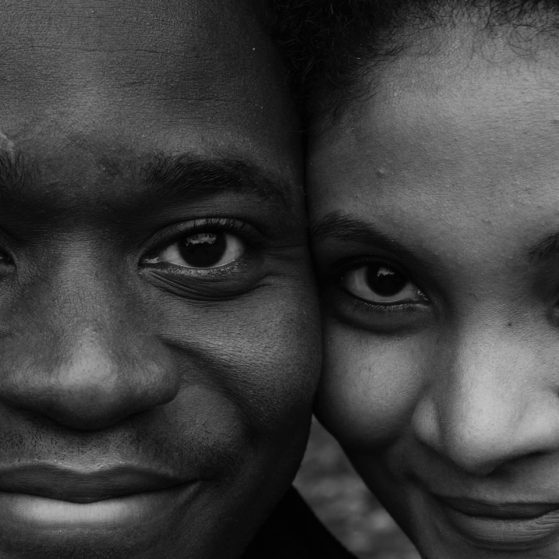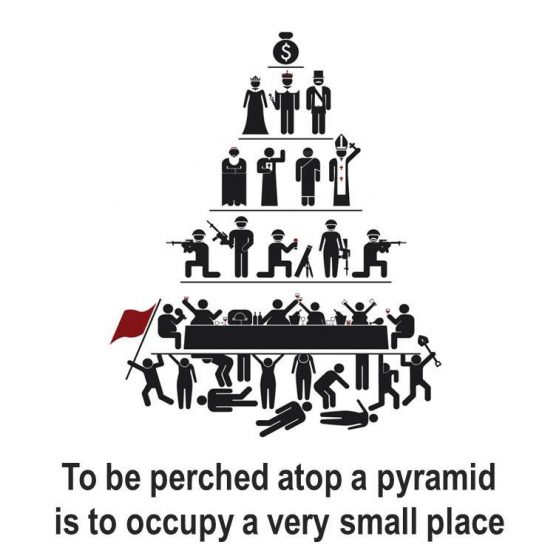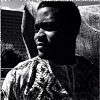Dear White People.

{source}
Dear white people,
For as long as I can remember, I have always been white. Like you. I just didn’t know it.
Born in the bipolar Nigerian city of soaring skyscrapers and sprawling slums, Lagos, I grew up thinking I was black like everyone else. All the signs were there — including my black skin, my shy head-hugging hair, and my Yoruba name with its lyrical tonality and vaunted meanings.
However, there wasn’t much more to that identity. Nothing special. When I walked down Jemtok Street to buy my dad a cold bottle of Guinness Extra Stout, it wasn’t black music that people were dancing to in street parties or black movie heroes that people were speaking animatedly about. We were all bedazzled by Sylvester Stallone’s Rambo and by your technological wizardry — evidenced in every gadget we owned or wanted to.
At school, we watched recorded clips of BBC news videos to learn how to pronounce English words properly. “Don’t open your mouth so wide,” our teachers would warn, not quite living up to their imposed standards. The soundtrack of our lives was the promise of traveling abroad and knowing the magic of meeting oyinbo people and living in oyinbo lands. Living oyinbo lives. The good life.
It was every man’s dream: the West, your home, was heaven, and God lived there.
Needless to say, a steady undercurrent of self-loathing flowed through our lives, urging us to civilizational heights of whiteness. To wear three-piece suits under a quizzical sun. To demonize our own traditions so that we could catch up with you.
It was nonetheless inescapably true to us: if it was white, it was right.
But one day, at least for me, it suddenly wasn’t.
I cannot recall when this shift happened — when I discovered to my dismay that underneath my cosmetic black skin was an inner whiteness, a Trojan guest behind enemy lines.
Soon, my entire energies were devoted to reclaiming my stolen blackness. My once secure tethering to the ground of Judeo-Christian truths came unfastened, and every church service seemed an invitation into an ignominious exclusivism.
I had grown to become another elite spokesman for white knowledge systems, polishing the walls of the ivory tower, walking past my own people with my laudatory gowns of academic achievement. An unusual, alien achievement. A House Negro. I however wanted to know what it felt like to be grounded in my own culture — whatever was left of it. To feel comfortable in my own flesh. I wanted to feel an ancestral outrage; I wanted to be angry with you for what your fathers and mothers did to ours.
When I sought out Yoruba healer-priests who consulted smaller gods and spoke with cowries, ram horns, and elaborate rituals, it was my way of wanting to be indigenous again. It was my silent protest against the predatory universality of the West. I would later travel the world, wear African colors, tell stories about tortoises and trickster spiders I had only learned about in libraries and books.
Becoming indigenous. It’s all the rave now, isn’t it? In a stunning reversal of plot, you all came back to our lands. This time, you didn’t bring the Bible or tell us that we need schools in order to learn properly (though some of you still do this), you came with paint on your faces, and trinkets and elaborate jewelry and ancient masks our more industrious brothers sold to you to help you feel indigenous.
In fact, it seems you are everywhere now, scouring the globe once again for a sense of home. A feeling of embodiment.
In India, where I now live with my Afro-Indian wife and daughter, there are so many of you here, clad in flowing kurtas, riding scooters barefoot, greeting others with a grave and heavy Namaste, offering symposiums on opening the third eye to the people who invented the concept, and flowing in and out of temples while the local folk scramble outside to erect kiosks to support your many pilgrimages.
I know you don’t mean to appropriate other cultural values, strip them of their context, package them into neat formulas or products and commercialize them. Or maybe you do, because you know no other way to approach the sacred. In any case, many of you have learned the painful lessons of colonial pasts and presents: you recognize that to displace another is to have displaced oneself. You understand — with silent whispers and hushed rumors — that white privilege isn’t working for you or anyone else. You realize that white exceptionalism is like a parenthetical remark in the middle of a sentence, pretending to be the whole book, and that to be perched atop a pyramid is to occupy a very small place.

{source}
With every new account of an oil spill, or of a dolphin struggling on the shore to deliver itself of plastic shrapnel gestating within her stomach, or of a suicide victim whose bank account was richer than third world nations, or of a politics that feels more beholden to the whims and fancy of giant corporations than to real public concerns, you feel there is something not quite right with this particular configuration of things. And so you, my white friends, orphans of a crowded sky, are seeking — like I am — a way to reclaim your place on earth. You seek your indigeneity. You seek a home.
I see you and identify with your struggle.
I also seek a land flowing with milk. And honey. And romantic glimpses of sunset. And sacred laziness. And meaningful work. And singing plants and sighing winds and an intense smallness — the kind that relieves you of that gnawing pressure to become someone and simultaneously deepens one’s appreciation of belonging.
I want to grow my own food.
I want to hunt a lion, and speak to him before I thrust my knife deeper into his throbbing side — thanking his feline body for offering itself up for my tribe’s sustenance.
On the other hand, I don’t. I would no sooner have pizza that I ordered off the internet than embark on a quest to kill my own food. And while growing one’s food is a revolutionary interruption of the moneyed regimes that now govern our appetites, identities and environments, there are some days when I would be happy to have a meal that was crafted in a lab.
How do I balance these competing urges? Does this make me less indigenous? Less original? Less African? Less true to my quests for decolonization?
I do not know, but I do suspect that this notion of indigeneity, as a static state of affairs, something to return to, is itself a product of white frames of knowing. No one knows what it means to become indigenous. Not even the indigenous.
Long ago, some of your fathers divided the world into two realms: a realm of appearance and a realm of permanence. Echoes of this radical schism at the heart of things still resonate today. We live in binaries. Us versus them. Language versus reality. Agent versus tool. Mind versus matter. Self versus environment. Free will versus determinism. Human versus nonhuman. Man versus woman. Public versus private. Consciousness versus world. Some things came to be seen as originary or superior, and others, derivative or inferior.
Rumors of this grand split, this radical out-of-touch-ness, infiltrated almost everything, and we all became possessed with a longing for reconciliation. For embodiment. For homecomings. We hoped that — like saints — when we go marching in, on some distant day of personal or collective rapture, we would know things as they truly are. We would finally be in touch, and then we would be true.
Indigeneity has the unfortunate dignity of bearing the weight of these civilizational expectations. As does nature. We have learned to speak about nature as if it were an uncontested place of arrival. Devoid of conflict. A heaven, where you might explore a verdant field of trees, bend a branch backwards, and somehow escape, by the virtue of being in heaven, the resulting backlash and scar on your skin. This nature with a halo, or nature as essentially good, blinds us to the many ways nature deconstructs itself.
Just as nature is undefined, what it means to be indigenous is indeterminate, and fully dependent on practices of seeing. It is perhaps easier to see now how these Euro-American ideas about returning to Eden and reclaiming an original have produced an objectified notion of indigeneity that is easier to exploit or appropriate. An indigenousness that is derived from, and responsive to, white gentrification.
In my own quests to decolonize myself and account for the trauma of my colonial heritage, I am learning some things that are probably clear enough to delineate:
* There is no indigenous self: I have implied this already, but it is worth repeating. Becoming indigenous cannot be about accessing some kind of ontologically pure foundation. Stripping apart successive layers of an onion will not bring you to the essence of the onion. It is also worth noting that if indigeneity is not a given or part of a binary situation, even modernity is a kind of indigeneity. Yes, the much-hated neoliberal capitalism and the techno-utopic longings for permanence and dominance are just as indigenous (and natural) as naked dances by moonlight (and other such spectacular ways Hollywood likes to depict non-western people). I might even venture to say that modernity is the indigenous practice of denying the significance of the nonhuman or the vibrancy of the world.
* Decolonizing myself is not about reclaiming a pre-existing given: Decolonization might suggest returning to an original practice, an ancient way, but the idea of originary paths are themselves products of white frames of knowing. Anti-colonial and Pan-African movements often try to enact justice by appealing to an elaborate ideal, a romanticized vision of Afrocentricity. In so doing, they uphold a politics of identity that is blind to changing contexts and the ineradicable markings of our colonial pasts. A different way to think about decolonization is as intimacy with where we are. It is accounting for and opening up to our embeddedness, not grappling for a platonic identity or transcendent quality.
* I am black, but I am white too: A shaman once told me he was going to turn me into a goat. He seemed serious about it, because I had dared question an aspect of his practice. I later came to understand how his ways of knowing might accommodate the preposterous idea of shapeshifting into something else. For Yoruba people, the world isn’t populated by independent things, moving by their own internal logic. The world is a web and, as such, boundaries are porous and ever-changing. We are constantly touching each other, infecting each other, so that it is impossible to trace out an original point. This suggests that my blackness co-arises with your whiteness; we are hyphenated aspects of each other.
I can trouble that last point further and say I am not only white, I am green as spirogyra. I am brown as tree and mountain and anthill. I am blue as sky. I am haunted by the chameleon, who has no qualms about the colors he takes on. I am no longer burdened by the need to enact an essence of blackness, because I now understand that becoming indigenous isn’t about finding essences, or fulfilling a cosmic imperative. To be indigenous is not to be original, it is to stray from original paths. It is to disturb calculable algorithms. It is about being sensitive and open to the world. It is about listening to the murmurings of place, sitting with the unnamed, following shadows towards unsayable adventures, and coming alive to a sensuousness that often resists articulation or conceptualization.
I therefore propose a series of different challenges and questions to you, my white friends — those of you who are already troubled by the politics of city and are moving towards the borderlands. Those of you who feel like you’ve had your feet planted in mid-air, and long to rest in sanctuaries of belonging. Those of you who ask me when we meet: “How do I become indigenous?”
* You are already indigenous: There is no need to become indigenous. This is the narrative of gaps and distances all over again. It has become popular to think of ourselves as separate from nature. We tell stories about a period in time when we were fundamentally delinked from the way the world truly is. As such, the imperative of our times, you say, is to rejoin nature and, in so doing, become indigenous again. But this narrative suggests that this really happened, and that you really are separate from the world and must return to it. Well, what if you never left? What if your bridges and rockets and buildings and roads and technology and GMOs are just another iteration of nature, albeit one which many now find troublesome? What if you are just as embedded in, and dependent on, land, water and air? What changes when the anxiety of arriving home or becoming indigenous is replaced with a studious slowness and a curiosity about where you are?
* Interrogate your whiteness: We are not born, we are made and produced and fashioned by material practices, scientific discourses, economic constraints, and political frameworks. Whiteness is also made — first summoned into being by the American industry of slavery. It is often argued that slavery had no respect for color at first. There were white and black slaves, comrades working in horrible circumstances, under the watchful eye of the prophets of profit. Whiteness became the administrative ruse to appoint mid-level managers over now black slaves. The scientific world also became complicit in reinforcing this regime of treachery — by publishing research that showed that black people were three-fifths of proper men. In short, an ethico-politico-scientific apparatus produced whiteness, sustained it on the promises of scarce privilege, and cut you off from the abundance of the world around you. The soul of whiteness is the colors it excludes from mattering, the colors and voices that now haunt you from liminal places.
* Saying sorry is not enough: Reconciliation today is often framed in terms of ornate performances of contriteness. Australia even has a National Sorry Day to commemorate and reflect on the mistreatment of indigenous peoples in that country. While this is no doubt important and powerful, seeking forgiveness is just a first step. Saying sorry is more likely to reinvest white power with the sort of moral nobility a philanthropist acquires for spreading his wealth. A deeper sort of accountability is needed — one that brings us to the edges of ourselves. One that helps us notice that we are a palimpsest of colors, and that who or what we are is always in the making. Forgiveness is settling debts; reconciliation is troubling boundaries.
* Listen: Notice the sacredness of where you are. The mysteriousness of where you are. This is a different notion of indigeneity altogether — not a provincialism, nativism or exoticism that objectifies identity, but a living breathing vocation of noticing the enchantment that is around us, in us, with us, wherever we are.
Is this my way of telling you not to travel, not to come to India, or say Namaste, or practice Yoga? Definitely not. This is not about sticking to a particular place. You don’t have to travel far in order to be indigenous. Where you are is already sacred… there is no realm to access or subterranean secret to be divulged.
In reworking whiteness, am I absolving it of responsibility and exalting it even further — in spite of its unfortunate exclusions, some of which are edifying to diversity? The answer is also No. I feel that a deeper accountability and responsibility must move beyond making reparations to challenging the boundary-making practices that sustains whiteness. If we must have many streams and not just the mainstream, we must rejoin the mysterious, material unfolding of the world.
Let me close this letter by saying this, dear white people. Sisters. Brothers. Fellow pilgrims in this unfurling saga of sound and silence. We need a new politics that does not cater to or reproduce the exclusionary whiteness you and I are prisoners of. This is a time for straying, for losing one’s way, for asking new questions. A sacred activism. A slowing down that knows enchantment is not in short supply.
***
{Join us on Facebook, Twitter, Instagram & Pinterest}

